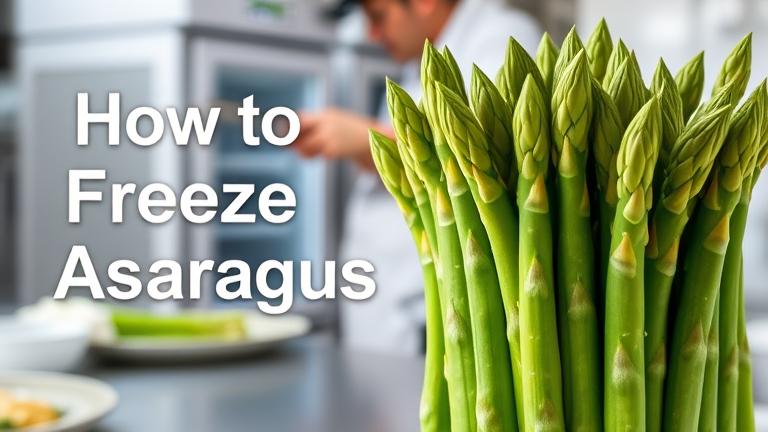Freezing Asparagus Without Blanching: A Time-Saving and Flavor-Preserving Method
Freezing asparagus without blanching offers several notable benefits for home cooks and food enthusiasts. This approach significantly cuts down on preparation time by eliminating the traditional step of boiling the vegetables briefly before freezing. Skipping blanching also helps maintain the asparagus’s natural flavor and texture, leading to a fresher taste when thawed.
Moreover, this method is effective in preserving more of the vegetables’ nutrients, which are often diminished during the blanching process. As a result, you can enjoy healthier, nutrient-rich asparagus that tastes just as fresh as when it was harvested. Overall, freezing asparagus without blanching simplifies the preservation process, making it quicker and more delicious for busy households and culinary adventurers alike.
How to Freeze Asparagus Without Blanching
To successfully freeze asparagus without blanching, start by selecting fresh, firm spears. Freshness is key for maintaining quality during freezing and storage. Rinse the spears thoroughly under cold water to remove any dirt, debris, or residual pesticides. Once cleaned, trim the woody ends to improve storage quality and ensure even freezing. Pat the asparagus dry with a clean towel or paper towels to eliminate surface moisture, which can cause the formation of ice crystals during freezing.
Next, arrange the spears in a single layer on a baking sheet lined with parchment paper. Ensure the spears are not touching each other to prevent sticking. Place the sheet in the freezer and flash freeze for about 1-2 hours until the asparagus is firm. This quick freezing process helps preserve texture and prevents clumping later on. Once frozen, transfer the asparagus to airtight freezer bags or containers, removing as much air as possible to prevent freezer burn. Label the packages with the date of freezing, then store at 0°F (-18°C) or lower for maximum freshness.
When ready to use, cook directly from the freezer without thawing to preserve flavor and texture. Properly frozen asparagus can last for up to 8 to 12 months, ensuring you have a nutritious and delicious vegetable on hand at all times.
Choosing the Best Asparagus for Freezing
The success of freezing asparagus without blanching hinges on selecting the freshest and highest-quality spears available. Fresh asparagus should feel firm and have tightly closed tips, indicating peak freshness. Its vibrant green color is also a good sign of nutritional content and flavor potential. Before freezing, thoroughly wash the asparagus to remove dirt and residues. Although blanching is traditionally recommended, when freezing without it, it is crucial to pre-treat the spears properly—for instance, by washing and drying diligently. Trimming off the woody ends not only improves appearance but also helps the asparagus cook evenly later.
Using the freshest asparagus maximizes flavor, texture, and nutrients after freezing. The fresher the vegetable at the outset, the better it will hold in the freezer. Proper initial preparation minimizes spoilage and spoilage-related freezer burn issues, ensuring you enjoy quality produce even months later.
Proper Packaging Techniques for Freezing Asparagus
Effective packaging is critical to maintaining the quality of frozen asparagus over time. Air is the enemy of freezer storage, so use airtight, vacuum-sealed bags to prevent freezer burn and moisture loss. Additional protective measures include wrapping the spears in aluminum foil or freezer-safe plastic wrap before placing them inside resealable containers. Heavy-duty, moisture-proof containers are also excellent options for long-term storage, helping to maintain consistent temperature and prevent odors from permeating the produce.
Label each package with the freezing date to monitor freshness and ensure you use the asparagus within the optimal time frame of 8 to 12 months. Proper packaging helps preserve flavor, texture, and nutrients, making your frozen asparagus taste just as fresh when cooked later. Applying these techniques ensures that your preserved vegetables stay high-quality and nutritious longer than poorly packed alternatives.
Common Freezing Mistakes to Avoid
Achieving perfect frozen asparagus requires attention to detail in preparation and storage. One common mistake is skipping the blanching step entirely when traditional methods recommend it, which may lead to color and texture degradation over time. However, as this article emphasizes, proper freezing techniques can compensate for this if performed correctly. It is crucial to dry the asparagus thoroughly after rinsing to prevent ice crystal formation, which can damage cell walls and cause sogginess upon thawing.
Another mistake is not removing enough air from the packaging, leading to freezer burn and flavor loss. Avoid stacking heavy objects on top of the asparagus, as the delicate spears can deform or crush under pressure. Keeping the freezer temperature at 0°F (-18°C) further extends shelf life and preserves nutritional value. Following these best practices will keep your frozen asparagus tasting fresh and nutritious, providing a healthy ingredient for quick meals.
Additional Tips for Cooking Frozen Asparagus
When you’re ready to incorporate frozen asparagus into your meals, remember that you can cook directly from the freezer. This saves time and maintains the vegetables’ delicate texture. Whether roasting, steaming, or stir-frying, frozen asparagus can be added straight into the cooking process without prior thawing. Since freezing without blanching can sometimes affect the texture slightly, using gentle cooking methods will help preserve the asparagus’s natural crispness.
For optimal flavor, season your asparagus during cooking, using herbs, garlic, or citrus to enhance its taste. Be mindful of cooking times overcooking frozen asparagus can lead to mushiness, so keep an eye on texture. Proper handling of frozen vegetables ensures they retain their nutrients and flavor, delivering a fresh-tasting result every time.
Video Tutorial: Freezing Asparagus Without Blanching
Watch this detailed video guide for a visual explanation of the process. It offers step-by-step instructions on how to select, prepare, freeze, and store asparagus without blanching, ensuring optimal quality and flavor preservation.
